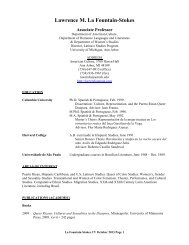Making History Personal: Constantine Cavafy and the Rise of Rome
Making History Personal: Constantine Cavafy and the Rise of Rome
Making History Personal: Constantine Cavafy and the Rise of Rome
You also want an ePaper? Increase the reach of your titles
YUMPU automatically turns print PDFs into web optimized ePapers that Google loves.
Frier, “<strong>Making</strong> <strong>History</strong> <strong>Personal</strong>,” page 13<br />
And yet <strong>the</strong>re remains for <strong>Cavafy</strong> one obdurate counterweight: <strong>the</strong> coin, forever record-<br />
ing “<strong>the</strong> charm <strong>of</strong> his lovely youth, / a glimmer <strong>of</strong> his poetic beauty, / a sensitive memento <strong>of</strong> an<br />
Ionian boy.” <strong>Cavafy</strong>’s willingness to claim, even for such a thoroughgoing rascal, a kind <strong>of</strong> re-<br />
demption through charm <strong>and</strong> physical loveliness, 40<br />
The Hellenistic polity reaches its rock bottom in “Should Have Taken <strong>the</strong> Trouble”<br />
(1930), one <strong>of</strong> <strong>Cavafy</strong>’s last poems.<br />
sounds a <strong>the</strong>me that echoes, <strong>of</strong> course, in<br />
many <strong>of</strong> his poems on his contemporary Alex<strong>and</strong>rians as well; one thinks particularly <strong>of</strong> “Days<br />
<strong>of</strong> 1896” (1925). Orophernes, lacking any <strong>of</strong> Demetrius’ interior honor, instead requests to be<br />
accepted for his exterior attractiveness alone. <strong>Cavafy</strong>, who displays no reluctance whatsoever in<br />
accepting this second-best alternative, accomplishes a similar redemptive feat in “That’s How”<br />
(1913; unpublished). A young man, his face known only from an “obscene photograph, which is<br />
secretly / sold in <strong>the</strong> street,” leads, no doubt, a “debased, sordid life,” but: “given all <strong>of</strong> this, <strong>and</strong><br />
more, to me you remain / <strong>the</strong> face that comes in dreams, a figure / fashioned for <strong>and</strong> dedicated to<br />
Greek pleasure— / that’s how you are for me still <strong>and</strong> how my poetry speaks <strong>of</strong> you.”<br />
41<br />
The anonymous narrator, a young Antiochene who claims<br />
an extensive education, has become “practically homeless <strong>and</strong> broke” even though he considers<br />
himself “totally / qualified to be <strong>of</strong> service to this country, / my beloved homel<strong>and</strong>, Syria.” The<br />
date is 125-123 BCE, in <strong>the</strong> midst <strong>of</strong> furious, ultimately futile squabbling among <strong>the</strong> surviving<br />
Hellenistic kingdoms. Toward <strong>the</strong> end <strong>of</strong> <strong>the</strong> poem, <strong>the</strong> narrator weighs his three options: to<br />
work for <strong>the</strong> current king Alex<strong>and</strong>er Zabinas (ruled 128-123), a pretender whom <strong>the</strong> Ptolemies<br />
had put forward as <strong>the</strong>ir c<strong>and</strong>idate in <strong>the</strong> midst <strong>of</strong> chaos following catastrophic events in 129, <strong>the</strong><br />
loss <strong>of</strong> Mesopotamia to <strong>the</strong> Parthians <strong>and</strong> <strong>the</strong> death <strong>of</strong> <strong>the</strong> last great Seleucid king, Antiochus VII<br />
Sidetes; or possibly for “his archrival, Grypus,” Antiochus VIII Grypus <strong>the</strong> nephew <strong>of</strong> Sidetes,<br />
who was crowned as a teenaged pretender in 125 <strong>and</strong> finally defeated Zabinas in 123 (Grypus’<br />
troubled reign lasted on-<strong>and</strong>-<strong>of</strong>f until his death in 96); or maybe even John Hyrcanus, <strong>the</strong> Helle-<br />
40<br />
Indeed, Pinchin, Alex<strong>and</strong>ria Still (1977) 51, argues that <strong>the</strong> redemption goes even fur<strong>the</strong>r: “A taste <strong>of</strong> nobility<br />
in <strong>the</strong> midst <strong>of</strong> <strong>the</strong> ridiculous, a taste <strong>of</strong> inept heroism, Hellenism.”<br />
41<br />
On this era, see Meyer, Hellenismus (1925) 272, who writes <strong>of</strong> <strong>the</strong> defeat <strong>and</strong> death (at <strong>the</strong> h<strong>and</strong>s <strong>of</strong> <strong>the</strong> Parthians)<br />
<strong>of</strong> Antiochus VII in 129, that it was “<strong>the</strong> catastrophe <strong>of</strong> Hellenism in continental Asia <strong>and</strong> at <strong>the</strong> same time <strong>of</strong><br />
<strong>the</strong> Seleucid Empire.” As Habicht, “Seleucids” 373, observes, <strong>the</strong> princes <strong>of</strong> this period “were not much more than<br />
condottieri, fighting against <strong>the</strong>ir cousins, against <strong>the</strong> growing <strong>and</strong> increasingly aggressive power <strong>of</strong> <strong>the</strong> Jews,<br />
against <strong>the</strong> Nabatean <strong>and</strong> Ituraean Arabs, <strong>the</strong> Greek cities in Syria <strong>and</strong> Phoenicia, <strong>and</strong> <strong>the</strong> local dynasts. The final<br />
agony <strong>of</strong> <strong>the</strong> Seleucids had begun.”
















